Western Sydney University Social Psychology Learning Journal 2
VerifiedAdded on 2023/04/03
|7
|1274
|352
Journal and Reflective Writing
AI Summary
This learning journal reflects on key concepts in social psychology, including self and identity, prejudice and discrimination, and attraction and close relationships. The reflection on self versus identity discusses the social cognitive self-theory and communication theory of identity, highlighting the importance of self-perception and societal belonging. The section on prejudice versus discrimination explores intergroup contact theory and the impact of social and political discriminatory settlements, emphasizing the need for positive interactions and policies to reduce discrimination. The reflection on attraction versus close relations differentiates between various forms of attraction and the specific dynamics of close relationships, referencing the social theory of attraction and the foundations of interpersonal relations. The journal also delves into subtopics such as real self versus idealized self, labeling theory, intergroup contact theory, and the social theory of attraction, providing a comprehensive understanding of these concepts in the context of human behavior and social interactions.

Last name 1
Title
Name
Institutional Affiliation
Title
Name
Institutional Affiliation
Paraphrase This Document
Need a fresh take? Get an instant paraphrase of this document with our AI Paraphraser
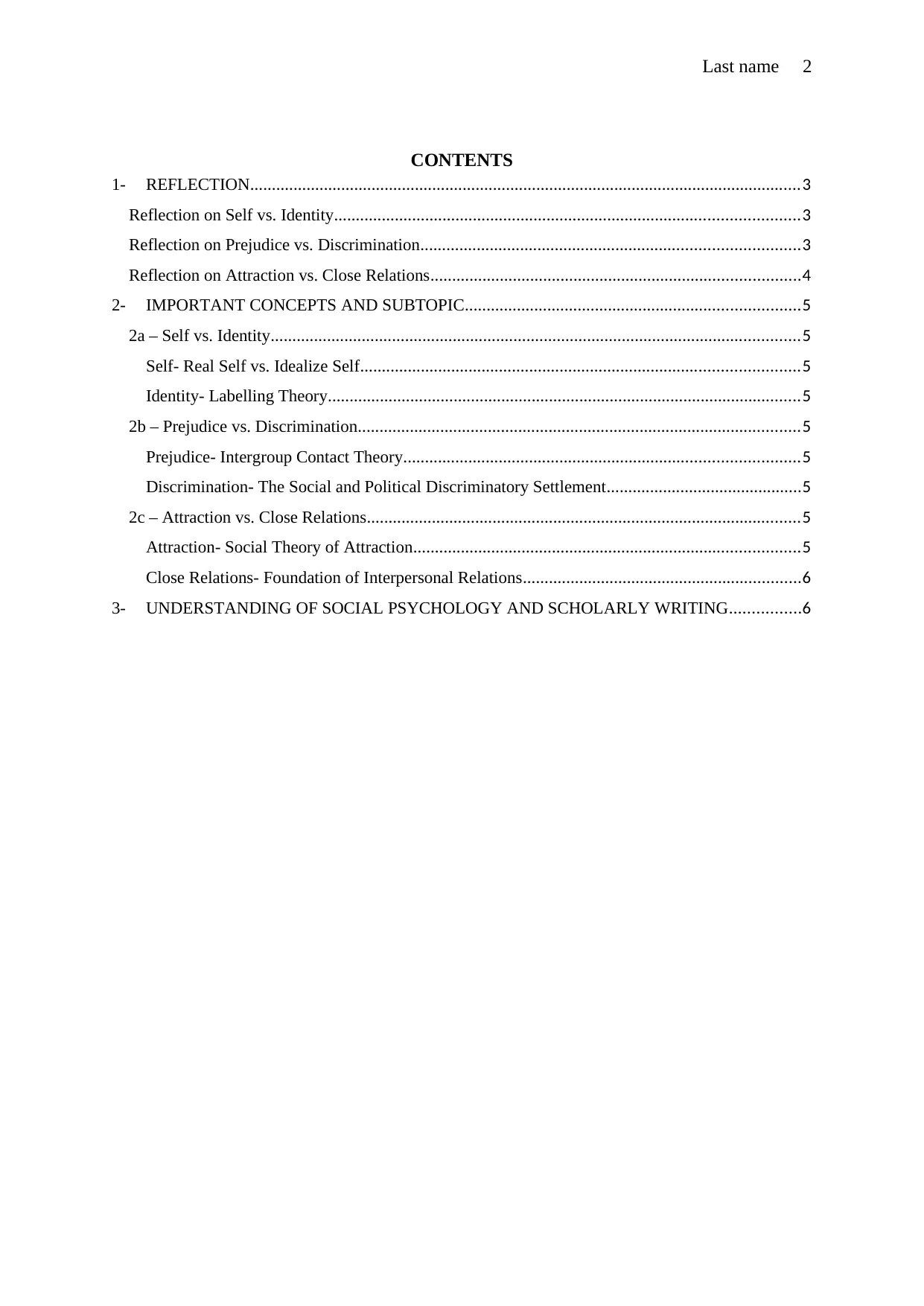
Last name 2
CONTENTS
1- REFLECTION...............................................................................................................................3
Reflection on Self vs. Identity...........................................................................................................3
Reflection on Prejudice vs. Discrimination.......................................................................................3
Reflection on Attraction vs. Close Relations.....................................................................................4
2- IMPORTANT CONCEPTS AND SUBTOPIC.............................................................................5
2a – Self vs. Identity..........................................................................................................................5
Self- Real Self vs. Idealize Self.....................................................................................................5
Identity- Labelling Theory.............................................................................................................5
2b – Prejudice vs. Discrimination......................................................................................................5
Prejudice- Intergroup Contact Theory...........................................................................................5
Discrimination- The Social and Political Discriminatory Settlement.............................................5
2c – Attraction vs. Close Relations....................................................................................................5
Attraction- Social Theory of Attraction.........................................................................................5
Close Relations- Foundation of Interpersonal Relations................................................................6
3- UNDERSTANDING OF SOCIAL PSYCHOLOGY AND SCHOLARLY WRITING................6
CONTENTS
1- REFLECTION...............................................................................................................................3
Reflection on Self vs. Identity...........................................................................................................3
Reflection on Prejudice vs. Discrimination.......................................................................................3
Reflection on Attraction vs. Close Relations.....................................................................................4
2- IMPORTANT CONCEPTS AND SUBTOPIC.............................................................................5
2a – Self vs. Identity..........................................................................................................................5
Self- Real Self vs. Idealize Self.....................................................................................................5
Identity- Labelling Theory.............................................................................................................5
2b – Prejudice vs. Discrimination......................................................................................................5
Prejudice- Intergroup Contact Theory...........................................................................................5
Discrimination- The Social and Political Discriminatory Settlement.............................................5
2c – Attraction vs. Close Relations....................................................................................................5
Attraction- Social Theory of Attraction.........................................................................................5
Close Relations- Foundation of Interpersonal Relations................................................................6
3- UNDERSTANDING OF SOCIAL PSYCHOLOGY AND SCHOLARLY WRITING................6
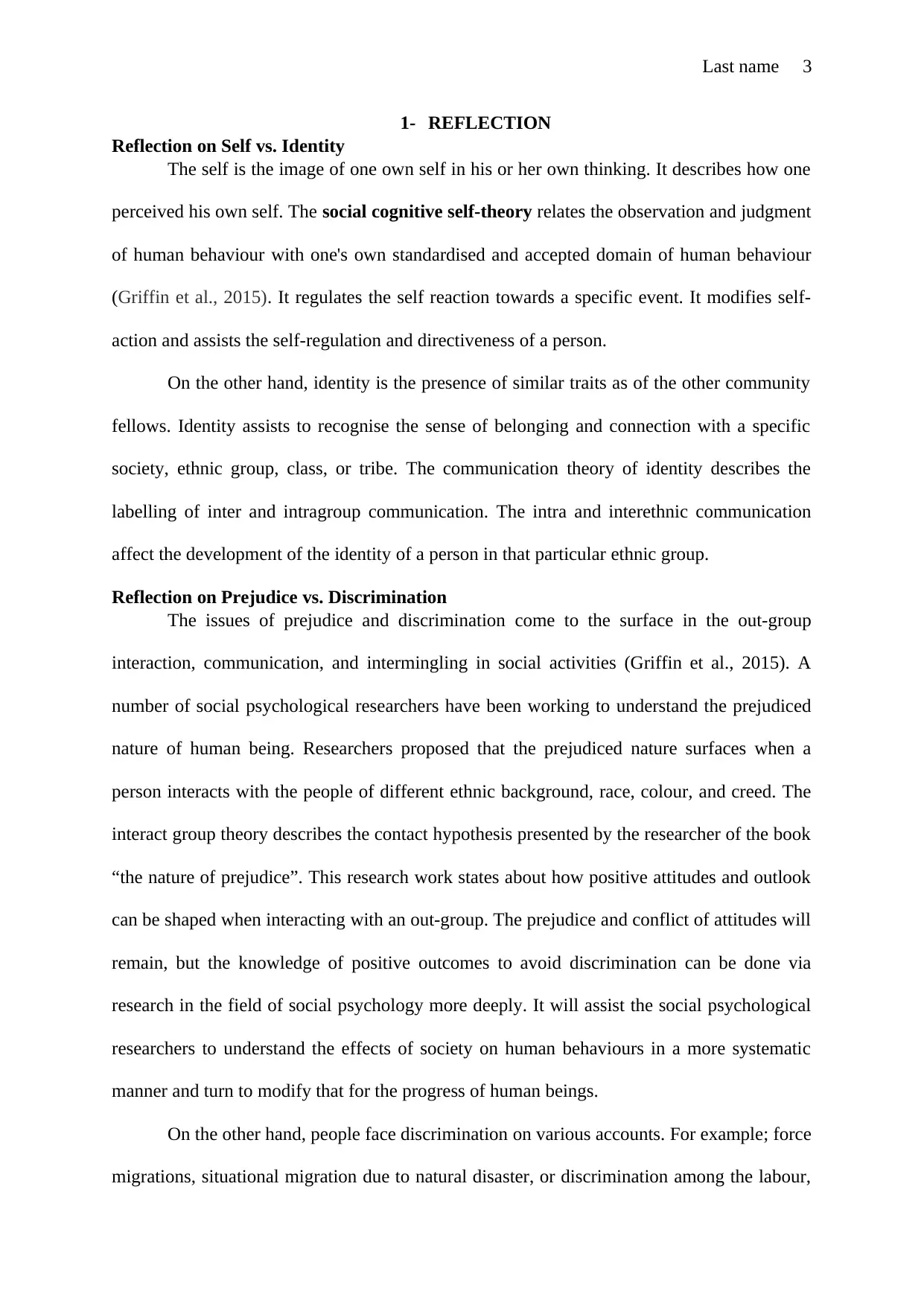
Last name 3
1- REFLECTION
Reflection on Self vs. Identity
The self is the image of one own self in his or her own thinking. It describes how one
perceived his own self. The social cognitive self-theory relates the observation and judgment
of human behaviour with one's own standardised and accepted domain of human behaviour
(Griffin et al., 2015). It regulates the self reaction towards a specific event. It modifies self-
action and assists the self-regulation and directiveness of a person.
On the other hand, identity is the presence of similar traits as of the other community
fellows. Identity assists to recognise the sense of belonging and connection with a specific
society, ethnic group, class, or tribe. The communication theory of identity describes the
labelling of inter and intragroup communication. The intra and interethnic communication
affect the development of the identity of a person in that particular ethnic group.
Reflection on Prejudice vs. Discrimination
The issues of prejudice and discrimination come to the surface in the out-group
interaction, communication, and intermingling in social activities (Griffin et al., 2015). A
number of social psychological researchers have been working to understand the prejudiced
nature of human being. Researchers proposed that the prejudiced nature surfaces when a
person interacts with the people of different ethnic background, race, colour, and creed. The
interact group theory describes the contact hypothesis presented by the researcher of the book
“the nature of prejudice”. This research work states about how positive attitudes and outlook
can be shaped when interacting with an out-group. The prejudice and conflict of attitudes will
remain, but the knowledge of positive outcomes to avoid discrimination can be done via
research in the field of social psychology more deeply. It will assist the social psychological
researchers to understand the effects of society on human behaviours in a more systematic
manner and turn to modify that for the progress of human beings.
On the other hand, people face discrimination on various accounts. For example; force
migrations, situational migration due to natural disaster, or discrimination among the labour,
1- REFLECTION
Reflection on Self vs. Identity
The self is the image of one own self in his or her own thinking. It describes how one
perceived his own self. The social cognitive self-theory relates the observation and judgment
of human behaviour with one's own standardised and accepted domain of human behaviour
(Griffin et al., 2015). It regulates the self reaction towards a specific event. It modifies self-
action and assists the self-regulation and directiveness of a person.
On the other hand, identity is the presence of similar traits as of the other community
fellows. Identity assists to recognise the sense of belonging and connection with a specific
society, ethnic group, class, or tribe. The communication theory of identity describes the
labelling of inter and intragroup communication. The intra and interethnic communication
affect the development of the identity of a person in that particular ethnic group.
Reflection on Prejudice vs. Discrimination
The issues of prejudice and discrimination come to the surface in the out-group
interaction, communication, and intermingling in social activities (Griffin et al., 2015). A
number of social psychological researchers have been working to understand the prejudiced
nature of human being. Researchers proposed that the prejudiced nature surfaces when a
person interacts with the people of different ethnic background, race, colour, and creed. The
interact group theory describes the contact hypothesis presented by the researcher of the book
“the nature of prejudice”. This research work states about how positive attitudes and outlook
can be shaped when interacting with an out-group. The prejudice and conflict of attitudes will
remain, but the knowledge of positive outcomes to avoid discrimination can be done via
research in the field of social psychology more deeply. It will assist the social psychological
researchers to understand the effects of society on human behaviours in a more systematic
manner and turn to modify that for the progress of human beings.
On the other hand, people face discrimination on various accounts. For example; force
migrations, situational migration due to natural disaster, or discrimination among the labour,
⊘ This is a preview!⊘
Do you want full access?
Subscribe today to unlock all pages.

Trusted by 1+ million students worldwide
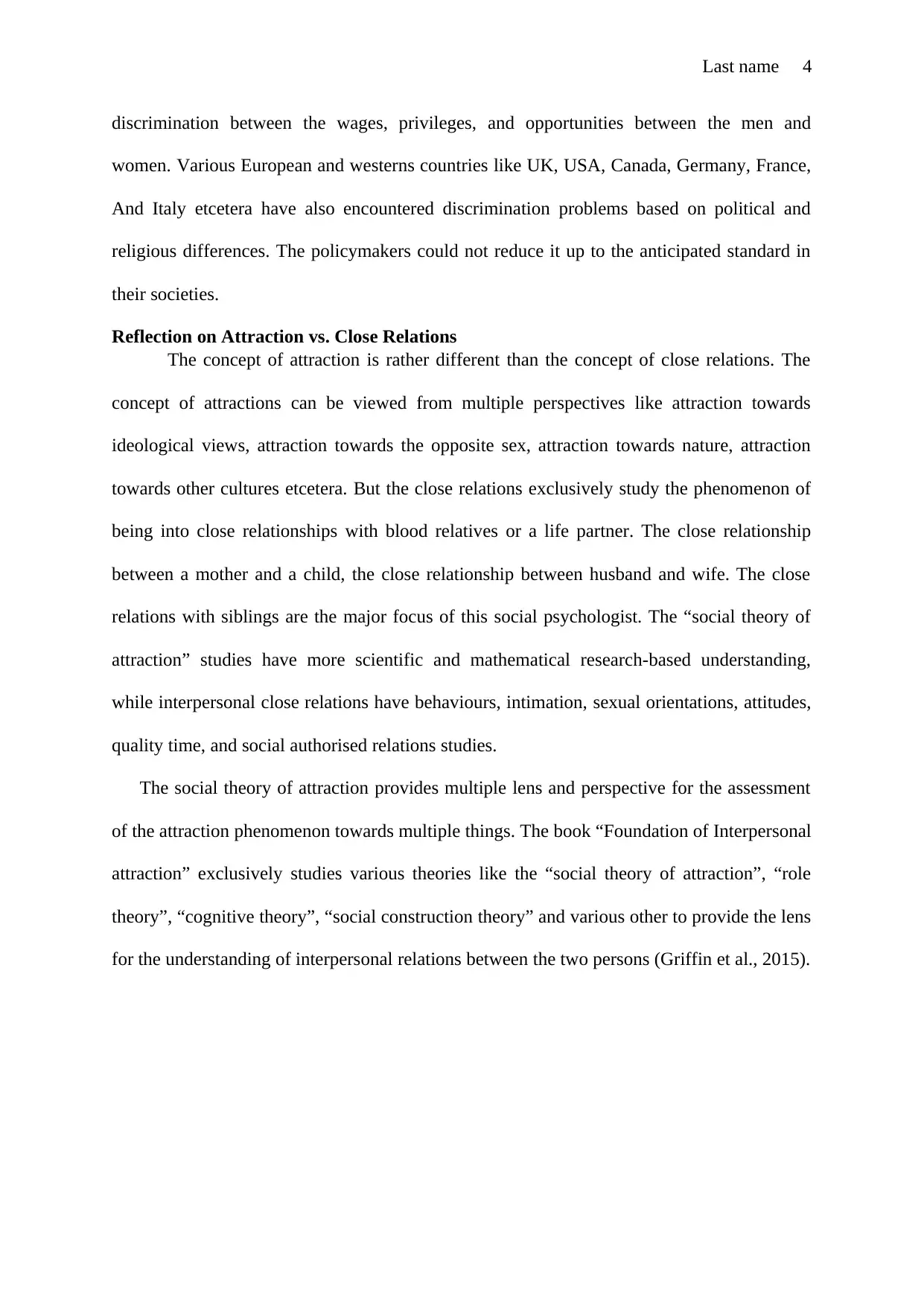
Last name 4
discrimination between the wages, privileges, and opportunities between the men and
women. Various European and westerns countries like UK, USA, Canada, Germany, France,
And Italy etcetera have also encountered discrimination problems based on political and
religious differences. The policymakers could not reduce it up to the anticipated standard in
their societies.
Reflection on Attraction vs. Close Relations
The concept of attraction is rather different than the concept of close relations. The
concept of attractions can be viewed from multiple perspectives like attraction towards
ideological views, attraction towards the opposite sex, attraction towards nature, attraction
towards other cultures etcetera. But the close relations exclusively study the phenomenon of
being into close relationships with blood relatives or a life partner. The close relationship
between a mother and a child, the close relationship between husband and wife. The close
relations with siblings are the major focus of this social psychologist. The “social theory of
attraction” studies have more scientific and mathematical research-based understanding,
while interpersonal close relations have behaviours, intimation, sexual orientations, attitudes,
quality time, and social authorised relations studies.
The social theory of attraction provides multiple lens and perspective for the assessment
of the attraction phenomenon towards multiple things. The book “Foundation of Interpersonal
attraction” exclusively studies various theories like the “social theory of attraction”, “role
theory”, “cognitive theory”, “social construction theory” and various other to provide the lens
for the understanding of interpersonal relations between the two persons (Griffin et al., 2015).
discrimination between the wages, privileges, and opportunities between the men and
women. Various European and westerns countries like UK, USA, Canada, Germany, France,
And Italy etcetera have also encountered discrimination problems based on political and
religious differences. The policymakers could not reduce it up to the anticipated standard in
their societies.
Reflection on Attraction vs. Close Relations
The concept of attraction is rather different than the concept of close relations. The
concept of attractions can be viewed from multiple perspectives like attraction towards
ideological views, attraction towards the opposite sex, attraction towards nature, attraction
towards other cultures etcetera. But the close relations exclusively study the phenomenon of
being into close relationships with blood relatives or a life partner. The close relationship
between a mother and a child, the close relationship between husband and wife. The close
relations with siblings are the major focus of this social psychologist. The “social theory of
attraction” studies have more scientific and mathematical research-based understanding,
while interpersonal close relations have behaviours, intimation, sexual orientations, attitudes,
quality time, and social authorised relations studies.
The social theory of attraction provides multiple lens and perspective for the assessment
of the attraction phenomenon towards multiple things. The book “Foundation of Interpersonal
attraction” exclusively studies various theories like the “social theory of attraction”, “role
theory”, “cognitive theory”, “social construction theory” and various other to provide the lens
for the understanding of interpersonal relations between the two persons (Griffin et al., 2015).
Paraphrase This Document
Need a fresh take? Get an instant paraphrase of this document with our AI Paraphraser
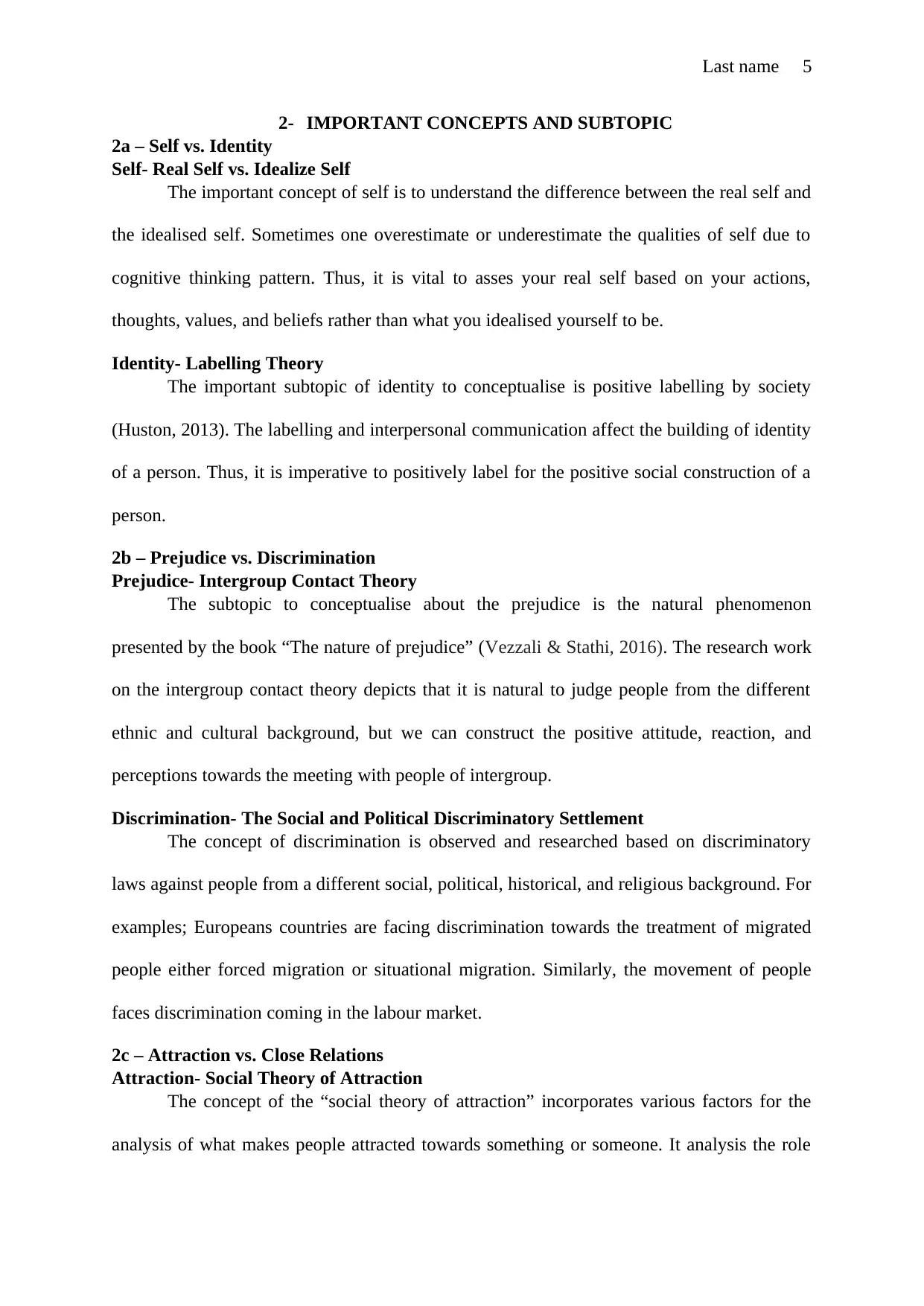
Last name 5
2- IMPORTANT CONCEPTS AND SUBTOPIC
2a – Self vs. Identity
Self- Real Self vs. Idealize Self
The important concept of self is to understand the difference between the real self and
the idealised self. Sometimes one overestimate or underestimate the qualities of self due to
cognitive thinking pattern. Thus, it is vital to asses your real self based on your actions,
thoughts, values, and beliefs rather than what you idealised yourself to be.
Identity- Labelling Theory
The important subtopic of identity to conceptualise is positive labelling by society
(Huston, 2013). The labelling and interpersonal communication affect the building of identity
of a person. Thus, it is imperative to positively label for the positive social construction of a
person.
2b – Prejudice vs. Discrimination
Prejudice- Intergroup Contact Theory
The subtopic to conceptualise about the prejudice is the natural phenomenon
presented by the book “The nature of prejudice” (Vezzali & Stathi, 2016). The research work
on the intergroup contact theory depicts that it is natural to judge people from the different
ethnic and cultural background, but we can construct the positive attitude, reaction, and
perceptions towards the meeting with people of intergroup.
Discrimination- The Social and Political Discriminatory Settlement
The concept of discrimination is observed and researched based on discriminatory
laws against people from a different social, political, historical, and religious background. For
examples; Europeans countries are facing discrimination towards the treatment of migrated
people either forced migration or situational migration. Similarly, the movement of people
faces discrimination coming in the labour market.
2c – Attraction vs. Close Relations
Attraction- Social Theory of Attraction
The concept of the “social theory of attraction” incorporates various factors for the
analysis of what makes people attracted towards something or someone. It analysis the role
2- IMPORTANT CONCEPTS AND SUBTOPIC
2a – Self vs. Identity
Self- Real Self vs. Idealize Self
The important concept of self is to understand the difference between the real self and
the idealised self. Sometimes one overestimate or underestimate the qualities of self due to
cognitive thinking pattern. Thus, it is vital to asses your real self based on your actions,
thoughts, values, and beliefs rather than what you idealised yourself to be.
Identity- Labelling Theory
The important subtopic of identity to conceptualise is positive labelling by society
(Huston, 2013). The labelling and interpersonal communication affect the building of identity
of a person. Thus, it is imperative to positively label for the positive social construction of a
person.
2b – Prejudice vs. Discrimination
Prejudice- Intergroup Contact Theory
The subtopic to conceptualise about the prejudice is the natural phenomenon
presented by the book “The nature of prejudice” (Vezzali & Stathi, 2016). The research work
on the intergroup contact theory depicts that it is natural to judge people from the different
ethnic and cultural background, but we can construct the positive attitude, reaction, and
perceptions towards the meeting with people of intergroup.
Discrimination- The Social and Political Discriminatory Settlement
The concept of discrimination is observed and researched based on discriminatory
laws against people from a different social, political, historical, and religious background. For
examples; Europeans countries are facing discrimination towards the treatment of migrated
people either forced migration or situational migration. Similarly, the movement of people
faces discrimination coming in the labour market.
2c – Attraction vs. Close Relations
Attraction- Social Theory of Attraction
The concept of the “social theory of attraction” incorporates various factors for the
analysis of what makes people attracted towards something or someone. It analysis the role
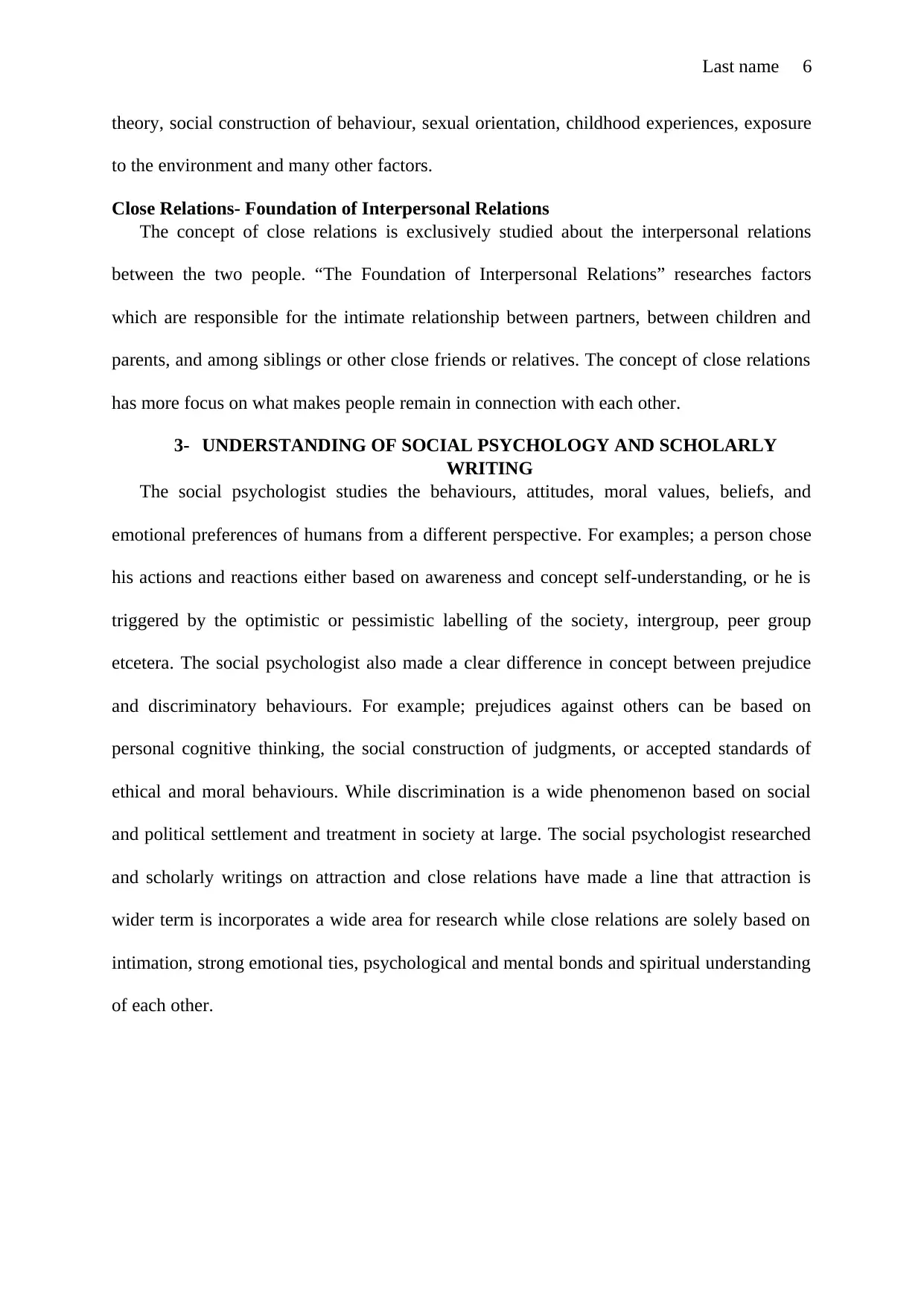
Last name 6
theory, social construction of behaviour, sexual orientation, childhood experiences, exposure
to the environment and many other factors.
Close Relations- Foundation of Interpersonal Relations
The concept of close relations is exclusively studied about the interpersonal relations
between the two people. “The Foundation of Interpersonal Relations” researches factors
which are responsible for the intimate relationship between partners, between children and
parents, and among siblings or other close friends or relatives. The concept of close relations
has more focus on what makes people remain in connection with each other.
3- UNDERSTANDING OF SOCIAL PSYCHOLOGY AND SCHOLARLY
WRITING
The social psychologist studies the behaviours, attitudes, moral values, beliefs, and
emotional preferences of humans from a different perspective. For examples; a person chose
his actions and reactions either based on awareness and concept self-understanding, or he is
triggered by the optimistic or pessimistic labelling of the society, intergroup, peer group
etcetera. The social psychologist also made a clear difference in concept between prejudice
and discriminatory behaviours. For example; prejudices against others can be based on
personal cognitive thinking, the social construction of judgments, or accepted standards of
ethical and moral behaviours. While discrimination is a wide phenomenon based on social
and political settlement and treatment in society at large. The social psychologist researched
and scholarly writings on attraction and close relations have made a line that attraction is
wider term is incorporates a wide area for research while close relations are solely based on
intimation, strong emotional ties, psychological and mental bonds and spiritual understanding
of each other.
theory, social construction of behaviour, sexual orientation, childhood experiences, exposure
to the environment and many other factors.
Close Relations- Foundation of Interpersonal Relations
The concept of close relations is exclusively studied about the interpersonal relations
between the two people. “The Foundation of Interpersonal Relations” researches factors
which are responsible for the intimate relationship between partners, between children and
parents, and among siblings or other close friends or relatives. The concept of close relations
has more focus on what makes people remain in connection with each other.
3- UNDERSTANDING OF SOCIAL PSYCHOLOGY AND SCHOLARLY
WRITING
The social psychologist studies the behaviours, attitudes, moral values, beliefs, and
emotional preferences of humans from a different perspective. For examples; a person chose
his actions and reactions either based on awareness and concept self-understanding, or he is
triggered by the optimistic or pessimistic labelling of the society, intergroup, peer group
etcetera. The social psychologist also made a clear difference in concept between prejudice
and discriminatory behaviours. For example; prejudices against others can be based on
personal cognitive thinking, the social construction of judgments, or accepted standards of
ethical and moral behaviours. While discrimination is a wide phenomenon based on social
and political settlement and treatment in society at large. The social psychologist researched
and scholarly writings on attraction and close relations have made a line that attraction is
wider term is incorporates a wide area for research while close relations are solely based on
intimation, strong emotional ties, psychological and mental bonds and spiritual understanding
of each other.
⊘ This is a preview!⊘
Do you want full access?
Subscribe today to unlock all pages.

Trusted by 1+ million students worldwide

Last name 7
References
Griffin, T., Passer, M. W., & Myers, D. G., 2015. The individual in society (3rd ed.). North
Ryde, NSW: McGraw Hill (Australia)
Huston, T.L. ed., 2013. Foundations of interpersonal attraction. Elsevier.
Vezzali, L. and Stathi, S. eds., 2016. Intergroup contact theory: Recent developments and
future directions. Taylor & Francis
References
Griffin, T., Passer, M. W., & Myers, D. G., 2015. The individual in society (3rd ed.). North
Ryde, NSW: McGraw Hill (Australia)
Huston, T.L. ed., 2013. Foundations of interpersonal attraction. Elsevier.
Vezzali, L. and Stathi, S. eds., 2016. Intergroup contact theory: Recent developments and
future directions. Taylor & Francis
1 out of 7
Related Documents
Your All-in-One AI-Powered Toolkit for Academic Success.
+13062052269
info@desklib.com
Available 24*7 on WhatsApp / Email
![[object Object]](/_next/static/media/star-bottom.7253800d.svg)
Unlock your academic potential
Copyright © 2020–2026 A2Z Services. All Rights Reserved. Developed and managed by ZUCOL.





